Interview with a hero...
As the written project is about allowing a common person to speak about his or her own history, I chose my father, because he was on a war, namely in the former portuguese colony, Guinea – Bissau. My father is 55 years old and he is now a mason in a water supply enterprise. Maybe if he had not been obliged to go to war, nowadays, he would have been in an easier position in life. It is this main impression that I have taken from the way he has spoken about it. The talk was in our living room, and we were on the sofa. It was then that I started this conversation:
1. In which Portuguese colony did you do your military service?
In Guinea – Bissau.
2. Were you obliged to go to war?
In the old days, everyone was obliged to go to war, or else you were arrested.
1. In which Portuguese colony did you do your military service?
In Guinea – Bissau.
2. Were you obliged to go to war?
In the old days, everyone was obliged to go to war, or else you were arrested.
3. In which year were you mobilized?
1972.
4. How old were you?
21 years old.
4. How old were you?
21 years old.
5. How long did you stay there?
I stayed there for 2 years.
 6. Where were you placed?
6. Where were you placed? I was placed in Bafatá, Bissau and Gadamael.
7. Were those places war zones?
Yes. Moreover, these were very heavy war zones.
8. Did you take part of any combat?
8. Did you take part of any combat?
No. Our group was lucky of never having a real combat face to face. We were more on guard.
9. Did you have any kind of military service in Portugal? If yes, do you think that you were well prepared?
Yes. First in Aveiro, then 15 days in Espinho and finally at Vila Nova de Gaia. It’s true; I was well prepared, because as we belonged to the artillery group we had to be very well instructed.
10. Were there many differences between the weapons of the Portuguese soldiers and of the guerrillas?
10. Were there many differences between the weapons of the Portuguese soldiers and of the guerrillas?

The guerrillas also had very good weapons like the supersonic canon (it breaks the speed of sound); perforating grenades…we were lucky because they shot from a long distance, so they did not know where they had hit. One funny episode happened when some guys were playing soccer and a grenade dropped down on the opposite side of the field. Everybody started running to the trenches, a sergeant that was very fat (he was capable of eating a tureen of soup) jumped on top of us, and he was the one that almost killed us because of his weight.

11. Was the army well equipped of weapons? Did you feel secure?

Yes, it was. We felt safe because we had good weapons to defend ourselves but in a war, who, on earth can feel safe enough?
12. And what were the conditions that you had there?
The conditions were really bad. We had a bath once a week, the food was frequently rice with tuna…many soldiers helped the cook of the company.
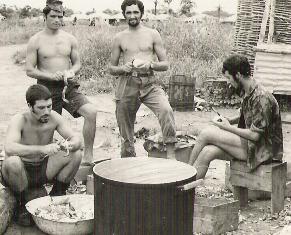
13. Did you starve?
Yes. There were times that we stayed four or five days in the brushwood. We starved and almost died of thirst. We had not many rations and not enough or any drinkable water.
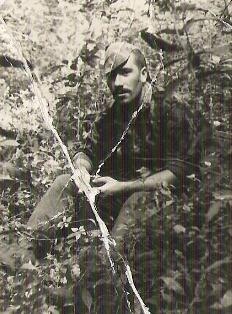
14. What were the orders that your officers gave to you?
Well, being on watch. When we left for the brushwood to look for the guerrillas fighters, it was to kill them. Nevertheless, in the middle of the group, everyone was very frightened of being caught napping and dying there.
15. What was the atmosphere that you, soldiers found there?
The atmosphere was quite peaceful. People weren’t afraid of us.
16. Do you agree with the fact that it was a war without a cause, assuming that it was already lost?
We went to a war that had no purpose, because we were in a place that wasn’t really ours.
17. How were the soldiers welcomed in Guinea?
Everyone treated me very well. We were strangers in a place even more unusual to us, but soon enough we fitted in with the local people. 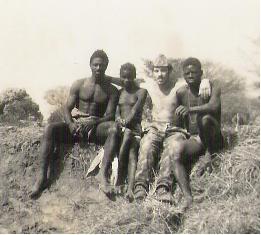 18. Was the interaction with another culture possible?
18. Was the interaction with another culture possible?
 18. Was the interaction with another culture possible?
18. Was the interaction with another culture possible? The things that they did were very odd, really!! For example, for them, a funeral was a festivity, where they danced, killed a pig and ate it. Then, the body was taken away, placed on some sticks and left behind for the vultures. After a while, they would come back and collect the bones, placing them in a box and burying them in the ground of their homes. There were many ethnic groups there and this strange ritual was only carried out by some of them. Another strange thing was that a man could have 12 wives. When one of them would become pregnant, he wouldn’t dare to touch her for a year or until she was ready to have children again.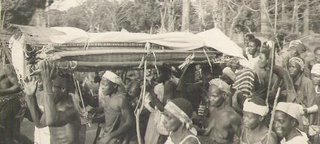

19. In the photos that you showed me, it seemed like there was no war going on? How do you explain this?
As the war was against the guerrillas, the atmosphere in town was more peaceful. The photos taken there only showed the inhabitants who were not directly involved in the war. They were peaceful and liked us. It was when we went to the brushwood, that there was more action.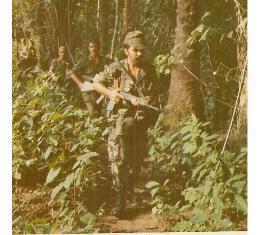

20. So, why were people so sociable with you?
Because many of them were against independence, as many others were in favour of it. In Portugal it happened the same thing. And one of the reasons, if you remember, of the revolution of 25 April of 1974 was precisely the colonial war. The revolution was made by those who were against it.
Because many of them were against independence, as many others were in favour of it. In Portugal it happened the same thing. And one of the reasons, if you remember, of the revolution of 25 April of 1974 was precisely the colonial war. The revolution was made by those who were against it.
21. Was the idea that you had about Guinea when you were in Portugal the same that you got when you arrived there?I did not know what the country was like. We had no idea of what was going on there. The only thing that we knew was that the war was killing many men. When I arrived there, at Gadamael Porto, we were attacked 5/6 times a day by long-distance canons.
22. And what about the echoes of the revolution in Portugal? What was the news that you had from your country?
We knew nothing. We only got the news after the coup d´état.
22. And what about the echoes of the revolution in Portugal? What was the news that you had from your country?
We knew nothing. We only got the news after the coup d´état.
23. What are your pleasurable memories? And your worst ones?
My pleasurable memories. Well, go fishing in the river, catching pigs in the brushwood so we could cook and eat them. And the worst ones, clearly the attacks, the gunshot noise, the fear…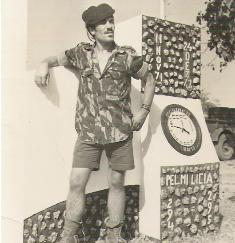

24. In what way did the participation in this war change the rest of your life?
It changed a lot because it was 2 years of my life wasted. If I hadn’t participated in this war I would have done a lot of things.
It changed a lot because it was 2 years of my life wasted. If I hadn’t participated in this war I would have done a lot of things.
25. What had impressed you most with this war?
The long range rockets. If they fell on a house, it would be destroyed. One good thing was going to the river, to throw grenades and bring many fish to the regiment. The snakes that we often found in the brushwood could eat a man.
Este trabalho faz parte de um projecto da cadeira de Inglês V, cadeira de opção oferecida aos alunos de Linguas e Literaturas Modernas, na Faculdade de Letras da Universidade de Coimbra leccionada pelo Professor Dr. John Havelda. O objectivo do projecto foi o de dar a palavra a alguém que nunca teve a oportunidade de contar a sua história, alguém que é apagada da História porque é uma pessoa comum. Espero que gostem!Carina
This work belongs to a project of English V, a discipline offered to students of Language and Modern Litterature by the Letters Faculty of the University of Coimbra, leisured by John Havelda. The aim was to give common people a chance to talk about their history that is always not included in History as a universal concept just because he or she is a common person. Hope you like it! Carina
Fonte: A Toca da Grila
Lanço aqui o desafio de quem quiser arranjar histórias verídicas que achem que devem ser perpetuadas pelo tempo. Basta investigarem e depois comunicarem comigo...